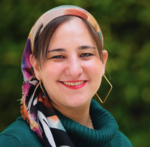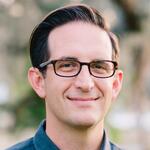
IJCR Upcoming Events
Jewish and Catholic Perspectives on Immigrants and Refugees
Thursday, March 19, 2026, 5:00 - 6:30 pm
Teletorium in Mandeville Hall (campus map)
In recent months and years, arguments over immigration and refugee practices have reached new levels of rancor in our polarized and enflamed society. Join us to hear Jewish and Catholic activists and leaders draw upon their respective traditions for guidance in these fraught times and in the light of current legal and constitutional concerns.
Dr. Beth Ford McNamee is the Director of the Center for Justice, Peace, and Integrity of Creation of the Sisters of Saint Joseph of Philadelphia. Previously, she was Associate Director of Saint Joseph's University Campus Ministry, where she oversaw local community service, social justice programs, student leadership formation, and a Campus Ministry Associate program. She also serves as an SJU adjunct instructor for INT 151 Inequality in American Society."
Cathryn Miller-Wilson, Esq. is the Executive Director of HIAS Pennsylvania, which provides services to refugees, asylum seekers, and displaced people. A graduate of the University of Pennsylvania Law School, she has served as a Visiting Assistant Professor at Villanova University School of Law, the Deputy Managing Attorney at the AIDS Law Project of Pennsylvania, and an adjunct professor at Drexel University Earle Mack School of Law.

Rabba Rori Picker Neiss serves as the Senior Vice President and Rabbi in Residence at the Jewish Council for Public Affairs (JCPA). She is one of the first graduates of Yeshivat Maharat, a pioneering institution training Orthodox Jewish women to be spiritual leaders and halakhic (Jewish legal) authorities. She is also a David Hartman Center fellow at the Shalom Hartman Institute of North America, a CLAL Rabbis Without Borders fellow, and sits on the Board of HIAS International.
Catholic Canon Law & the Rights of Non-Catholic Parents: The Mortara Case
RESCHEDULED! Tuesday, April 14, 2026, 5:00 - 6:30 pm
Teletorium in Mandeville Hall (campus map)
In 1858, a six-year-old Italian Jewish boy, Edgardo Mortara, was taken from his family by Vatican authorities when it was reported that their Christian housekeeper had secretly baptized him as an infant. Since canon law and civil law stipulated that a baptized child must be raised Catholic, Pius IX used his power as head of the Papal States to remove Edgardo from his family so he could receive a Christian education. In litigation brought by the parents, the Vatican invoked Thomas Aquinas to justify the child’s seizure. The family’s efforts failed to reunite them with Edgardo, who went on to become a Catholic priest. The case has relevance for the current Catholic Code of Canon Law about the infant baptism of children of non-Catholic parents and to the Second Vatican Council’s teaching on religious freedom and the Jewish people.

Dr. Matthew Tapie has recently published the definitive book about the Mortara case, The Mortara Case and Thomas Aquinas’s Defense of Jewish Parental Authority, which includes all the relevant documents in English translation. He is Associate Professor of Theology, and Director of the Center for Catholic-Jewish Studies at Saint Leo University, Saint Leo, Florida. His teaching and research interests are in the thought of Thomas Aquinas, Judaism and Christian theology, and Catholic-Jewish relations.
Jesus: Good Jew, Bad Jew, or Anti-Jew?
Postponed until the Fall Semester. Date TBA.
Teletorium in Mandeville Hall (campus map)
The fact of Jesus’ Jewishness should be so obvious as to need no discussion. Despite the clear statements in the New Testament, there have been many people, from the second century to the present, who have denied and/or qualified Jesus’ Jewishness, and others for whom his Jewish identity comes as a surprise.
This program will trace the development of these perspectives, from the unequivocally Jewish Jesus of the Gospels, to the “baptism” of Jesus as a Christian at the hands of the Church Fathers and later theologians, to the Nazi “Aryan Jesus,” and to Jesus’s “reconversion” to Judaism in the 20th century. It will suggest that uneasiness about Jesus’ Jewishness, while shaped primarily by historical and social factors over the millennia, can be detected even in the Gospels themselves, as the evangelists, like later theologians, were trying to square Jesus’ Jewish identity with the increasingly Gentile composition of the Jesus movement.
Dr. Adele Reinhartz is Distinguished University Professor at the University of Ottawa, where she teaches in the Department of Classics and Religious Studies. Her main research areas are the Gospel of John, ancient Jewish/Christian relations, and Bible and Film. In 2021 she won the Konrad Adenauer Prize, awarded to one Canadian annually by the Humboldt Foundation in Germany. Her most recent book is Ethics in the Fourth Gospel (2025).